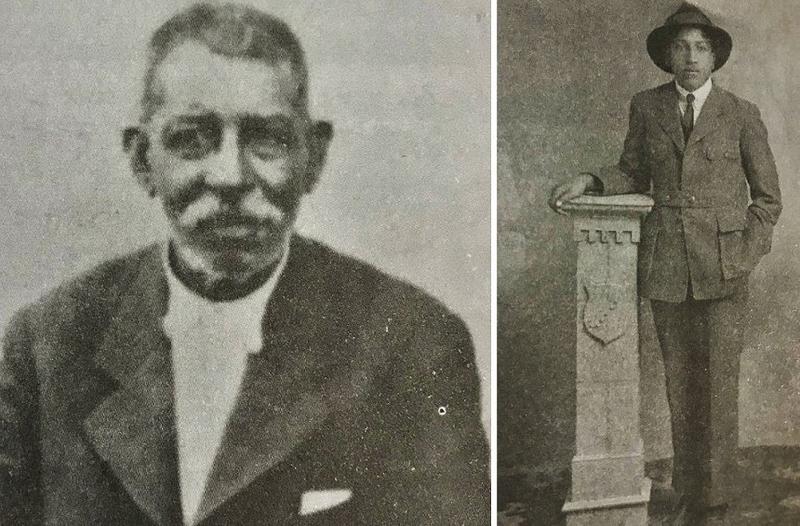
He was one of the most characteristic figures of Limassol at the start of the 20th century. Active, multi-faceted and extroverted, Theodoros Mavros was not just a typical example of a Limassolian. Rather, as his nickname-turned-surname ‘Mavros’ (‘Black’) implies, he was a biracial Limassolian with African roots, who was an integral part of the unknown history of the Africans who had originally arrived in Cyprus as slaves.
Slavery and slave trading existed for centuries on the island, until 1925 when it was banned by British colonists. People from Africa had been transported to Cyprus to serve as industrial slaves or, in the cases of women, to join harems, and many remained on the island after the abolition of slavery, some with families of their own through mixed-race marriages. The case of Theodoros Christodoulou, who became known as ‘Mavros’ due to the prominence of his African descent, is a clear example of a man who was not banished to the sidelines as a result of his diversity, but rather, became an active member of the local community and earned his own income.
Theodoros Christodoulou, a sharp-witted man with a can-do attitude, made a name for himself in business early on. The inventiveness and entrepreneurial spirit that have distinguished generations of Limassolians were also among the main qualities attributed to Theodoros Mavros. He founded one of the island’s first transportation companies, serving the ever-increasing communication needs between the city and villages of Limassol.

Theodoros Mavros and Heracles Skyrianides (who later went on to establish the ‘Pafsilipon’ Hotel in Platres) were among the first to offer transportation services using animals and carriages and, later, buses, to and from the countryside.
With his lively energy and business acumen, Theodoros also dabbled in the field of marine transportation. Indeed, as Kimon Charalmbides writes in his book, he was the only barge captain who opposed the command of ships by the British powers during the First World War.
Beyond having a wide range of interests, Theodoros Mavros was also quick-witted and quick with a retort, a trait that always left an impression during his daily interactions with the people of Limassol.
The financial comfort that Mavros achieved allowed him to maintain a grandiose profile, though he tended to remain folksy in his general attitude. His beach home was carefully decorated with French furniture, as per the fashion of the time, an extravagance he managed to pull off thanks to his regular trade dealings abroad.

The balcony of the family house.
The fact that he had secured a certain amount of wealth was not a reason for him to tamper his facetious personality. As he did not belong to any of the city’s prominent social classes, he made himself known through his activities, particularly through the operation of one of the first beachside recreation centers of Limassol, Aktaio. The tragicomic urban legends that surround his name are still heard to this day, and bear witness to the peculiarity of his character.

When a regular customer at Aktaio noticed that the orchestra’s clarinet player was playing rather poorly, Mavros immediately deemed him lazy. He then proceeded to fire the musician, which led to protestations from the customers, who ultimately saved the man from his fate.
As vivid a personality as he was, his children proved to be even more so, carrying on the family tradition of being active members of the local community. His daughter, Iren, was a particularly powerful force.

Iren was leading the movement for the coordination of volunteers on the side of the Allied Forces in the Middle East, during the Second World War. In the picture, she leads a dancing circle in the camp.
Iren built a reputation for herself as a bold and daring woman who would often ride bareback, and was also the only woman to agree to join a circus acrobat on his motorcycle ‘death ride.’ As for Yiannakis, Theodoros' son, he was targeted by the British due to his participation in the October Events, the anti-colonial revolt against the British, which led to his arrest.

The 4 children of Theodoros Mavros, with Kimon Charalambides as a little kid in the middle.
Theodoros Mavros, having bid farewell to his city in February 1945, managed to intertwine his own life with the daily life and identity of Limassol itself. The city’s multiculturalism, its vitality and entrepreneurship also played a central role in the life of Theodoros Mavros.

Young Theodoros on the left and his daughter Iren on the right.
After all, his close contact with the sea appears to have been a determining factor in shaping his personality, which is why in the text devoted to him by Kimonas Charalambides, he is remembered as being ‘upheaved with the upheavals of the sea, and serene with its serenity.”
Sources: “Once upon a time in Limassol,” by Kimonas Charalambides, “Those who built yesterday,” by Kimonas Charalambides.
* NOTE: The tributes of the Project "History of Limassol" present information that has emerged from historical research thus far. Any new data is embedded into the tributes, once it has been confirmed.